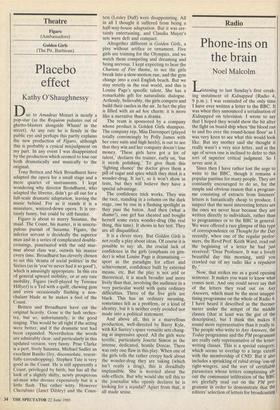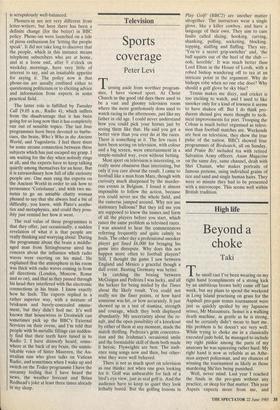Radio
Phone-ins on the brain
Noel Malcolm
Listening to last Sunday's first creak- ing instalment of Kidnapped (Radio 4, 9 p.m.), I was reminded of the only time I have ever written a letter to the BBC. It was when they announced a serialisation of Kidnapped on television. I wrote to say that I hoped they would show the bit after the fight on board ship when 'the blood ran to and fro over the round-house floor' as I was very keen to see what this would look like. But my mother said she thought it really wasn't a very nice letter, and at the age of seven one is inclined to defer to this sort of superior critical judgment. So I never sent it.
Since then I have rather lost the urge to write to the BBC, though it remains a popular pastime for many people. They are constantly encouraged to do so, for the simple and obvious reason that a program- me consisting of extracts from listeners' letters is fantastically cheap to produce. I suspect that the most interesting letters are the ones we never hear because they are written directly to individuals, rather than to programmes or to the BBC in general. We were offered a rare glimpse of this type of correspondence on Thought for the Day recently, when one of the regular perfor- mers, the Revd Prof. Keith Ward, read out the beginning of a letter he had just received: 'Dear Professor, It was a lovely beautiful day this morning, until you crawled out of my radio like a repulsive fly.'
Now, that strikes me as a good opening sentence. It makes you want to know what comes next. And one could never say that of the letters they read out on Any Answers, which must be the most unappe- tising programme on the whole of Radio 4. I have heard it described as the thermo- meter under the armpit of the middle classes (that at least was the gist of the description), but I think this makes It sound more representative than it really is. The people who write to Any Answers, the Today programme and the PM programme are really only representative of the letter- writing classes. This is a special category, which seems to overlap to a large extent with the membership of CND. But it also includes a sprinkling of rabid string-'em-uP right-wingers. and the sort of certifiable paranoiacs whose letters complaining ab- out the communist infiltration of the BBC are gleefully read out on the PM pro- gramme in order to demonstrate that the editors' selection of letters for broadcasting
is scrupulously well-balanced.
Phoners-in are not very different from letter-writers; but here there has been a definite change (for the better) in BBC policy. Phone-ins were launched on a tide of pious enthusiasm for 'letting the people speak'. It did not take long to discover that the people, which in this instance means telephone subscribers who are at home, and at a loose end, after 9 o'clock on weekday mornings, have very little of interest to say, and an insatiable appetite for saying it. The policy now is that phone-ins are usually confined either to questioning politicians or to eliciting advice and information from experts in some practical field.
The latter role is fulfilled by Tuesday Call (9.05 a.m., Radio 4), which suffers from the disadvantage that it has been going for so long now that it has completely run out of sensible topics. The last four programmes have been devoted to barbe- cues, the brain, Who's Who in the Ancient World, and Yugoslavia. I feel there must be some arcane connection between these subjects which has just escaped my grasp. I am waiting for the day when nobody rings at all, and the experts have to keep talking quietly among themselves for an hour. But it is extraordinary how full of idle curiosity people are. One man rang the experts on the Ancient World in order to ask how to pronounce 'Coriolanus', and with two mi- nutes to go an amiable chatty woman phoned to say that she always had a bit of difficulty, you know, with Plato's aesthe- tics and metaphysics, and could they poss- ibly just remind her how it went.
The real value of these programmes is that they offer, just occasionally, a sudden revelation of what it is that people are really thinking and worrying about. During the programme about the brain a middle- aged man from Sittingbourne aired his concern about the influence which radio waves were exerting on his mind. He
explained that the atmosphere in his room was thick with radio waves coming in from all directions (London, Moscow, Rome and so on), and that as they passed through his head they interfered with the electronic connections in his brain. I know exactly how he feels. The experts replied in a rather superior way, with a mixture of briskness and barely-concealed amuse- ment, but they didn't fool me. It's well known that housewives in Droitwich can sometimes pick up the BBC's External Services on their ovens, and I'm told that people with bi-metallic fillings can sudden- ly find that their teeth have tuned in to Radio 2. I have distinctly heard, some- where at the back of my brain, the unmis- takable voice of Sister Maureen, the Au- stralian nun who gives talks on Vatican Radio, and sometimes when I wake up and switch on the Today programme I have the uncanny feeling that I have heard the news, the weather forecast and Brian Redhead's joke at least three times already in my sleep.















































 Previous page
Previous page